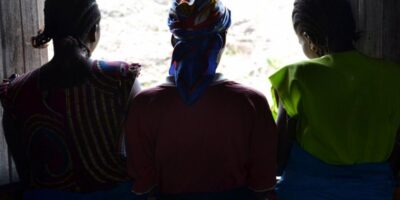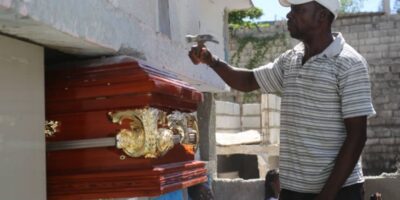The seizure of these blood pouches highlights dangerous blood trafficking between the Dominican Republic and Haiti
Customs agents in Ouanaminthe intercepted a shipment of 27 pouches of blood, some of which are probably contaminated with hepatitis, coming from the Dominican Republic on October 13, 2023, officials at the Ministry of Public Health and Population (MSPP) confirm to AyiboPost, as well as authorities in the North-East department.
“Preliminary results show that there are suspicions of hepatitis C contamination in a few specimens, but nothing for HIV/AIDS,” reveals the departmental director of the MSPP for the North-East, Dr. Jean Denis Pierre. According to the doctor, the final results will be communicated to the population.
Medication can cure more than 95% of people infected with hepatitis C. But the seizure highlights a dangerous blood trade between the Dominican Republic and Haiti.
Preliminary results show that there is suspicion of hepatitis C contamination in a few specimens, but nothing for HIV/AIDS. […] the final results will be communicated to the population.
This trafficking, carried out outside of the control of the State, remains illegal. However, it thrives on an urgent need for blood in hospital centers in the North-East department. A need that the regional Red Cross—which is virtually dysfunctional—cannot satisfy, according to Anderson Latortue, a manager within the institution.
“A pouch of blood purchased in the DR can sell for between 4,000 to 5,000 pesos,” Anderson Latortue reveals to AyiboPost.
In a press release issued on November 17, the Red Cross maintains that the CNTS uses its premises free of charge in several regions of the country, but it has no technical or administrative responsibility in the management of blood products since October 2020. According to the Red Cross, the CNTS continues to misuse the institution’s logo in certain media. This use has been denounced, says the institution.
Nearly 400,000 people live in the North-East, a department bordering the Dominican Republic. According to 2015 data from the MSPP, 42 health institutions, nearly 70% of which are public, are listed in the area.
A decree from October 13, 2020 establishing the creation and organization of the blood and blood products organization (ONASAPS) hands over the distribution of blood on Haitian territory to the National Blood Transfusion Center (CNTS) or the National Transfusion Safety Program. Any import of human blood must go through this structure responsible for testing the product before distribution, according to the law.
But the institution, under-equipped with an inadequate budget, is unable to play its role, according to its director, Dr. Ernst Noël. “Last year, we were only able to collect 22,000 pouches of blood, while the country requires between 60,000- 80,000 bags of blood per year,” argues the doctor.
Read also : Transfusion sanguine : à court de ressources et de donneurs, le CNTS appelle à l’aide
The CNTS has fifteen blood transfusion stations and around twenty storage facilities to store blood collected across the country. “The vast majority of storage facilities in provincial towns – including the two structures in the North-East – do not work,” declares Dr. Ernst Noël.
In this context, doctors in towns on the border advise families in need to buy blood in the Dominican Republic, according to two hospital managers in the area interviewed by AyiboPost.
A pouch of blood purchased in the DR can sell for between 4,000 and 5,000 pesos.
“When I send a patient to get blood from the Haitian Red Cross, they never find any,” says Dr. Leslie Manigat, head of the Ouanaminthe Medical Center.
Also, the hospital gives a prescription to its patients who often cross the border. “When a patient arrives with a pouch of blood, before using it, the first thing we do is check if the liquid is in good condition in our laboratory,” Dr. Leslie Manigat continues to AyiboPost.
L & M Medical Center, another health institution in the department confirms the practice. “If we have a patient who suffers from severe anemia, we give them the prescription so that they can go and buy the blood elsewhere, but we do not do it for them,” says an L & M official who declined to provide his name to the hospital switchboard.
When I send a patient to get blood from the Haitian Red Cross, they never find any.
The MSPP is aware of the practice. “I am informed of the circulation of these [imported] pouches in the department, but the seizure of the 27 pouches marks the first time that we have succeeded in stopping this type of operation,” said the departmental director of the MSPP, Dr. Jean Denis Pierre to AyiboPost.
Read also : Pourquoi est-ce si difficile d’obtenir du sang en Haïti ?
The illegal cargo was intercepted from two o’clock in the afternoon during an inspection of Haitian migrants voluntarily leaving the Dominican Republic, according to witnesses.
On the sidelines of tensions between the two countries over Haiti’s construction of a canal on the Massacre River, 34,000 Haitian migrants returned home voluntarily, according to a report from the Support Group for Refugees and Returnees (GARR) published on October 16.
“We spotted a young man who was leaving the Dominican Republic carrying a box,” the vice delegate of the Ouanaminthe district, Harold Joseph, told AyiboPost.
The carrier was not authorized to transport the blood shipment, according to the regional authority. “A doctor known in the area then came to request the blood pouches, explaining that it was an order for his patients who are in need,” the vice delegate continued.
Harold Joseph did not want to reveal the identity of said doctor. He said that he transmitted the information to the proper authorities for further action.
The director of the office of the Minister of Public Health and Population, Dr. Jean Hugues Henrys, confirms for AyiboPost that an investigation into this matter is underway.
This article has been updated with a press release from the Red Cross. 12.47 20.11.2023
English translation by Sarah Jean.
Cover image : GETTY IMAGES / AFP / MONEY SHARMA
Stay in touch with AyiboPost through :
► Our WhatsApp channel : click here
► Our WhatsApp Community : click here
► Our Telegram canal : click here







Comments